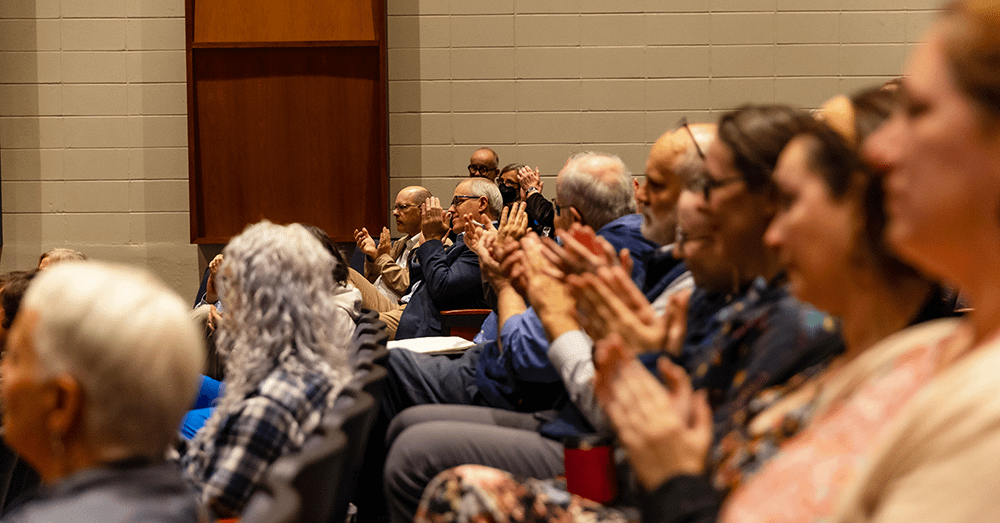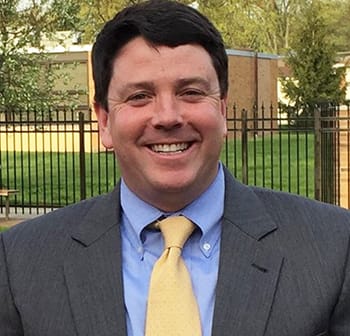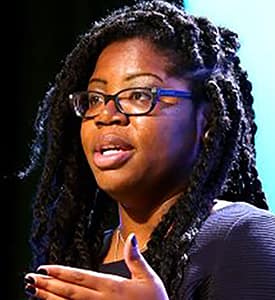Senegalese Film Festival
Talk by rights-activist Bocoum caps Senegalese Film Festival
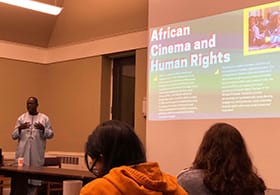
Moussa Bocoum presents to classes about Senegalese cinema during his campus visit in thes images (photos by Laurence Clerfeuille)
Campus screenings of four films by renowned African filmmakers (Angèle Diabang Brener, Sembène Ousmane, Moussa Sène Absa, and Djibril Diop Mambéty), the Senegalese Film Festival at Saint Michael’s College ended on November 11 with a lecture entitled “Oral Practices and Political Dissent in Senegalese Cinema” by Moussa Bocoum.
The guest speaker presented a survey of the history of Senegalese Cinema and explained its political dimension and defense of human rights and talked about his Non-Governmental Organization (NGO) in Dakar called Yellitaare. Bocoum is a human rights advocate and the president and founder of Yellitaare (which means “empowerment” in the Fulani language). His organization promotes gender equality and equity and fights against forced marriages.
Bocoum holds a doctorate in African Cinema from the University of Southern California. He worked with internationally renowned Senegalese filmmaker Sembene Ousmane, considered as “the Pope of African Cinema.” Bocoum made a documentary, Against the Tides of History: Landmines in Casamance (selected by the United Nations Film Festival) and wrote several scripts on AIDS to be shown on television in Senegal and for the Ministry of Education in Senegal. He is currently working on Passages, a film on race relations and women empowerment.
Bocoum 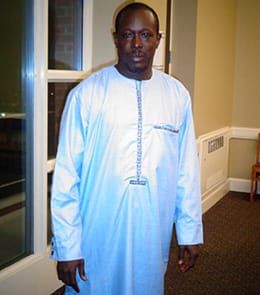 got the opportunity to meet many Saint Michael’s students, which he said after was the most interesting part of his stay in Vermont. He visited three French classes: French 203, “Third Semester French; French 310, “Advanced Communication and Culture”; and French 460 “Changing the World.” In those classes he discussed Senegalese cinema and literature as well as issues of racism and discrimination against Africa — a continent whose history is still largely silenced and ignored, and looked down upon, he said.
got the opportunity to meet many Saint Michael’s students, which he said after was the most interesting part of his stay in Vermont. He visited three French classes: French 203, “Third Semester French; French 310, “Advanced Communication and Culture”; and French 460 “Changing the World.” In those classes he discussed Senegalese cinema and literature as well as issues of racism and discrimination against Africa — a continent whose history is still largely silenced and ignored, and looked down upon, he said.
Students were able to ask him questions and also share with him their takes and opinions on Senegalese texts and films studied in class. Festival organizer Laurence Clerfeuille of the French faculty said Bocoum was impressed by the quality of their French (especially for students taking their third semester of French who were able to carry advanced conversations of difficult topics) and their accurate understanding of details pertaining to Senegalese culture. He also visited a course on Senegalese Culture (French 270/ Global Studies 270) in English, a course taken by the fourteen students participating in the academic study trip to Senegal (December 26, 2019-January 10, 2020) led by Clerfeuille and Moïse St. Louis, associate dean of students/director of The Center for Multicultural Affairs and Services.
These conversations are important, said Clerfeuille, explaining that college students need to be exposed to different cultures and different perspectives and they should know more about Africa and its rich diversity. “I hope that they understand, after meeting with Moussa Bocoum, that Senegal has a unique history and culture and that Senegalese intellectuals, artists, and human right advocates (among others) are active subjects who all contribute to bringing new answers the their country,” said Clerfeuille.


